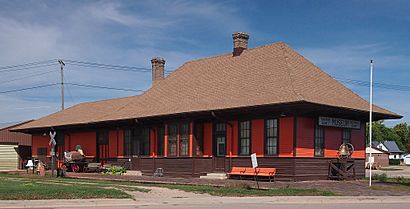Wheaton Depot facts for kids
Quick facts for kids
Wheaton
|
|||||||||||
|---|---|---|---|---|---|---|---|---|---|---|---|
| Former Milwaukee Road passenger rail station | |||||||||||

The Wheaton Depot from the south
|
|||||||||||
| Location | 1201 Broadway, Wheaton, Minnesota 56296 | ||||||||||
| History | |||||||||||
| Opened | 1884 | ||||||||||
| Rebuilt | 1906 | ||||||||||
| Services | |||||||||||
|
|||||||||||
|
Chicago, Milwaukee and St. Paul Depot
|
|||||||||||
| Location | 1201 Broadway Avenue, Wheaton, Minnesota | ||||||||||
| Area | Less than one acre | ||||||||||
| Built | c. 1906 | ||||||||||
| Architect | Chicago, Milwaukee & St. Paul Railroad | ||||||||||
| NRHP reference No. | 85001818 | ||||||||||
| Designated | August 23, 1985 | ||||||||||
The Wheaton Depot is an old train station in Wheaton, Minnesota. It was built around 1906. This station handled both people traveling and goods being shipped.
The Chicago, Milwaukee & St. Paul Railroad, also known as the Milwaukee Road, built it. It replaced an older station from 1885 that had burned down. The depot was used until 1976. In 1985, it was added to the National Register of Historic Places. This means it's an important building because of its design and its role in transportation. It shows how important the railroad was to the town.
Since 1977, the depot has been a museum. The Traverse County Historical Society runs it.
Contents
What Does the Wheaton Depot Look Like?
The Wheaton Depot is a long building with one story. It is made of wood. The outside walls have overlapping wooden boards called clapboard. It has windows with six small panes of glass on the top and six on the bottom.
The roof is shaped like a pyramid (a hip roof). It has wide edges that stick out. You can see the wooden beams, called rafters, under the roof. The side of the building that faced the train tracks has a special window that sticks out, called a bay window. There are also two doors for passengers. Above these doors are small windows called transom windows. Two big doors were used for loading and unloading freight.
Inside the Depot
The inside of the depot followed a common design for train stations. One end of the building was a large room for freight. The other end had separate waiting rooms. There was one room for men and another for women. An office separated these two waiting rooms.
History of the Wheaton Depot
Wheaton was started in 1884. It was built along a new railroad line. This line went north from Ortonville, Minnesota. The Fargo and Southern Railway built this track.
The First Station and the Fire
In 1885, the Milwaukee Road bought the Fargo and Southern Railway. They quickly built a train station in the new town of Wheaton. This first building was very important. For 21 years, it was Wheaton's main way to connect with the outside world. But in March 1906, the station caught fire and burned down.
Building the New Depot
The Milwaukee Road built a new station in the same spot. It was probably designed by J. U. Nettenstrom. He was the company's architect at that time. The new depot used a standard design. Many Milwaukee Road stations in medium-sized towns used this design. Using a standard design helped keep building costs low. It also made all the stations look similar along the rail line.
How the Depot Helped Wheaton Grow
Before cars and highways, the train station was the main way to get in and out of Wheaton. Almost everyone who traveled came through the depot. It was also where goods arrived. Local farm products were sent to markets from here. Mail came and went by train too. The depot even had the local telegraph office. The railroad and this station were very important for Wheaton's growth. The town soon became the county seat and a major trade center for the area.
End of an Era
At its busiest, the Wheaton Depot had four trains every day. But in the 1930s, more people started using cars. Because of this, passenger train service stopped. Freight service continued until 1976. That year, the Milwaukee Road closed the station for good.
The next year, the Traverse County Historical Society bought the building. They fixed it up and turned it into a museum. It now tells the story of the county's history. The railroad removed its tracks in 1980. In 1984, the historical society added a metal building next to the depot. This addition helps the museum have more space.
 | James B. Knighten |
 | Azellia White |
 | Willa Brown |



